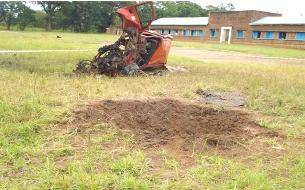Landmine incident is gruesome reminder of war in Sudan’s Central Equatoria
By Boboya James
September 25, 2008 (YEI) — A landmine in a village in Central Equatoria, South Sudan, detonated under a vehicle on Sunday, killing one person instantly and seriously wounding others. The vehicle detonated an anti-tank mine as it took part in a driver training workshop at Loka Secondary School compound, located in Loka village near Lainya.
 The vehicle belonged to an indigenous organization, Needs Service Education Agency (NSEA), which was founded in 1994 by a professional South Sudanese educator. NSEA’s vision is an educated, enlightened and self-reliant society. The mission is to promote quality education.
The vehicle belonged to an indigenous organization, Needs Service Education Agency (NSEA), which was founded in 1994 by a professional South Sudanese educator. NSEA’s vision is an educated, enlightened and self-reliant society. The mission is to promote quality education.
On the evening of Sept. 21, the vehicle, a Toyota Pickup dedicated to facilitate the workshop, ran over the mine as it was being driven by NSEA staff. One victim was said to have been standing at a distance as far as 150 meters from the scene, collecting water in a borehole. He was rushed to Yei Civil Hospital. According to reports all involved sustained major injuries.
After decades of civil war in the Sudan and after the singing of the Comprehensive Peace Agreement in January 2005 there is still no peace for many people facing underground enemies and silent killers.
More than one million people died during the 21 years of brittle war and many millions were displaced. But now, as IDPs and refugees are supposed to be returning home, explosive remnants of war (ERW) have blocked resettlement, use of agricultural areas and infrastructure such as schools, bridges, roads and churches.
Returnees are very worried as they keep coming back home to use these areas. As of now the scope of the mine problem in the south still remains unknown.
Several mine action humanitarian organizations have been receiving millions of dollars from donors to deal with the mine problems, but most funds are allotted for mine risk education and advocacy, and few go to mine clearance programs.
The existence of explosive remnants of war (ERW) in southern Sudan has also contributed to poverty. Hence, many communities are now suffering and even delivery of humanitarian assistance is hindered.
(ST)
